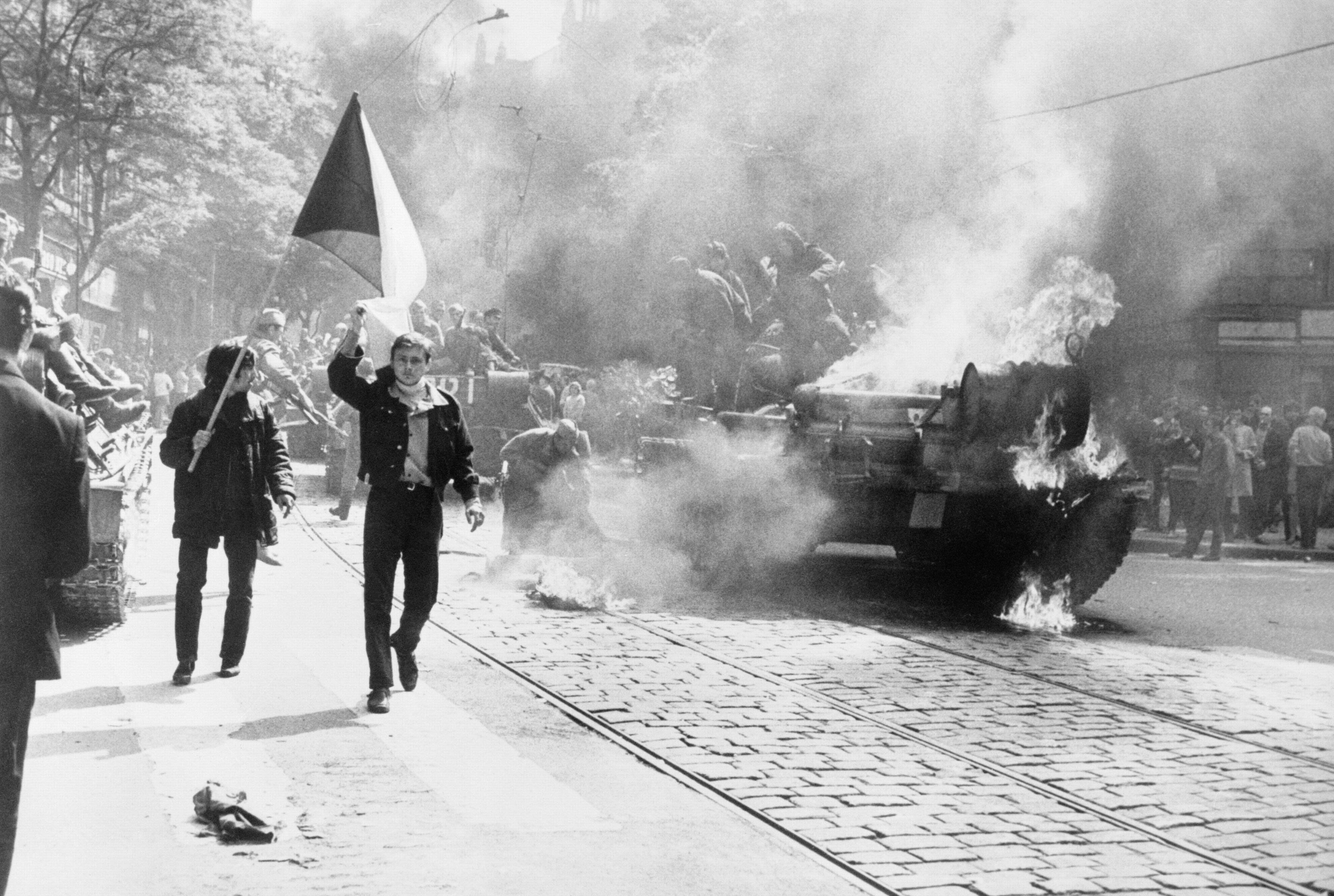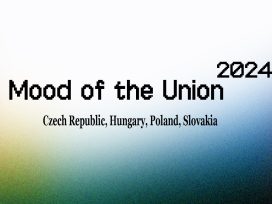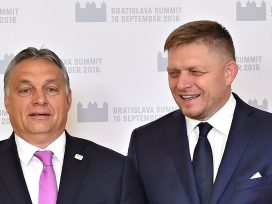
Czechoslovaks carry their national flag past a burning tank in Prague during the Soviet invasion of Czechoslovakia (1968). Photo: “CIA Analysis of the Warsaw Pact Forces: The Importance of Clandestine Reporting”. Source: Wiki Commons
The essay on ‘How I became a Czech and a Slovak’ was written in 2008 as a reflection on my very personal experience of what can be called retroactively the ‘power of powerless’ and (east) European solidarity. It was published in May 2008, a few months before Russian troops, armed with heavy artillery, tanks and aircraft, invaded a small mountainous country in the Caucasus: Georgia. The basic reason for the invasion was simple – to prevent the drift of that country toward the West and, inter alia, give a lesson to other post-Soviet neighbours who might have dared to follow suit.
At the global level, the event passed virtually unnoticed. Western media at the time praised Chinese autocrats for their perfect organization of the Olympic games; western leaders, as if nothing had happened, shook hands with the Russian president in Beijing and smiled happily; the western public enjoyed the holidays and passively consumed the Moscow-baked narrative about reckless Georgia that had attacked peace-loving Russia and got its just deserts. Western reaction boiled down ultimately to expressions of ‘deep concern’ and calls for ‘both sides of the conflict’ to refrain from violence and settle the problem peacefully. Both the rapist and the victim of the rape were supposed to feel satisfied.
The West’s evasiveness and ambiguity came as little surprise to me since I’ve long since learnt that, in politics, interests usually prevail over values, that politicians depend primarily on their native, not foreign, electorates, and that the sheer amount of global poverty, suffering and injustice is so huge that you would certainly go crazy if you were to think about it all the time. Human beings have developed a whole set of complacent arguments disguised as common wisdom – like ‘charity begins at home’, ‘might makes right’, and ‘God helps those who help themselves’.
This does not mean that there is no room for morality in politics, or that we should not remind politicians about the values and principles upon which the liberal-democratic West was built. The trade-off between values and interests is really difficult and sometimes irresolvable. But every time we sacrifice our values for the sake of interests we risk ultimately losing both.
I came to believe that we are entitled to criticize western evasiveness and ambiguity, hypocrisy and betrayal only if we possess a healthy dose of self-criticism – both personal and national. It means, in particular, that we cannot demand from the West solidarity with our seventy-plus political prisoners in Russia unless and until we expose the same solidarity with political prisoners all over the world. We cannot expect much western concern about the Russian-occupied regions of Donbas and Crimea if we don’t care ourselves about, for instance, Chinese-occupied Tibet. We cannot blame western governments for their opportunistic flirtation with rogue regimes if we tolerate the same ambiguity on the side of our own government.
In Michael Winterbottom’s 1995 film ‘Welcome to Sarajevo’ there is a remarkable episode when UN dignitaries visit the besieged city, terrorized by artillery shelling and snipers’ shooting. ‘When are you going to act?’ the journalists ask the visitors with frustration. ‘When are you going to rescue at least the children?’ – ‘Well’, the top official responds, ‘we have some plans on the table. But believe me, there are at least 13 other places in the world where the situation is even worse than here’.
I drew two lessons from that episode. First, we should always remember that our plight is probably not the grimmest; there might be at least 13 countries or nations that are doing much worse. And secondly, we should always remind the proverbial ‘internationals’ about all the 14 dire cases rather than only one, the dearest for us. This would not only make our stance more credible and morally sound, but also disable the proverbial ‘internationals’ from indulging themselves in all 14 places with the same excuse for doing nothing.
In 2008, after the Russian invasion in Georgia, I was not much surprised by the western reaction to that event or, rather, lack thereof. It stemmed from a long tradition of realpolitik which presumed that some states are entitled to much more sovereignty than others, and can manage the ‘legitimate sphere of their privileged interests’ at their whim. This assumption determined both the post-WWI and post-WWII European order, facilitated the Soviet invasion of Hungary in 1956 and of Czechoslovakia in 1968, and legitimized the Soviet demand for Jaruzelski’s military crackdown on Polish workers in 1981.
Stanisław Barańczak, a prominent Polish poet and essayist, complained bitterly at the time about the West’s self-indulgent readiness to shift all the responsibility from perpetrators onto their victims: ‘Everybody in the West asks whether Solidarity went too far; nobody asks whether General Jaruzelski went too far. Despite all its sympathy and compassion, the West seems to accept silently the basic assumption of Eastern propaganda: that the communist authorities are always right when they’re defending their monopoly of power. They never go too far, even when they declare a state of war against their own people. It’s the people who go too far and who quite necessarily bring defeat upon themselves each time they demand some clean air to breathe – some of those basic liberties the West enjoys’.
In 2008, it was the Georgians who ‘went too far’ with their naïve belief in national sovereignty and the inviolability of recognized borders, but certainly not Russians who, whatever they do, never go too far – just because very few western leaders have the guts to call a spade a spade and a rogue state a rogue state.
What struck me then was not western fecklessness vis-à-vis Putin’s chutzpah and EU’s poorly veiled condonation of his de facto banditry. The most striking was the lack of reaction from easterners, specifically from Czechs and Hungarians – the people who should have definitely discerned a sinister similarity between their own experience and the travail of modern-day Georgians. Nothing like that had happened. No meetings, no protests, no Georgian flags at the Russian embassy.
It was a silent but comprehensible signal to Moscow to keep on going. Never too far. At least, within the ‘legitimate sphere of privileged interests’. I had suddenly felt at the time that Ukraine would be next. I dared to voice it in a couple of articles and interviews. Nobody took it seriously.
In August 2008, I should have probably changed the end of my essay so that it wouldn’t sound so optimistic. And so naïve. I discovered that I had never read the acclaimed Milan Kundera essay on the ‘Tragedy of Central Europe’ carefully enough. My idealistic view of the region was largely informed by his – and his east central European colleagues’ – compelling claims to our ‘European belonging’ and legitimate right to ‘return back’ into the family of free European nations. I ignored Brodsky’s criticism of Kundera’s position, even though he quite perspicaciously outlined it as too essentialist vis-à-vis the West and too exclusivist vis-a-vis the rest. Kundera’s explicit message was: we, the Czechs (the Poles, the Hungarians) are Europeans in our both culture and history; we were betrayed by the West in Yalta and sold out to Stalin, but we never accepted this and would never accept it; we don’t belong to the Soviet realm because we, central Europeans, are different, we are like you, the westerners, and therefore we deserve freedom.
Whether all other nations in the Soviet realm also deserved some freedom, – even though they were not ‘central European’ and some of them were not ‘European’ at all – was not clearly articulated in Kundera’s text, but implicitly and probably unintentionally it established some hierarchy of ‘more’ and ‘less’ European nations and therefore more and less freedom-loving and deserving of immediate (or not-so-immediate) liberation. Kundera’s concept, as Ukrainian philosopher Volodymyr Yermolenko aptly remarked, ‘may have been liberating for central Europe, but for the Europe situated further east it was disastrous. Instead of breaking down the wall between East and West, it simply shifted it further eastwards. The idea should have been used to fight totalitarianism everywhere, but instead localized it geographically in the territories of the former USSR, thereby placing a permanent ‘curse’ on our east European lands […] Instead of remaining faithful to his own dictum and seeing just how much diversity there is on the whole of the European continent, Kundera chose to split it into two parts, in opposition to each other — the humanist West versus the demonic East that had kidnapped a [central European] part of the West.’
It would be an obvious overstatement to blame Kundera’s essentialism and exclusivism for his compatriots’ eventual ignorance and indifference towards anything happening further east of Prague, Budapest, Ljubljana, or Bratislava. This was not the cause of their supremacism but rather a consequence – a reflection of local mentality, of specific cultural traits and ethnic stereotypes. Kundera did not invent them but took them for granted, and never tried to question or deconstruct them.
In February 2014, on the last days of Ukraine’s Revolution of Dignity, I was approach by phone by a young journalist from Prague who asked me to comment on the dramatic events in Kyiv. Her first question was dull but indicative: ‘What is there that happened in Kyiv? Revolution or coup d’état?’
I was depressed. It was not that the question was per se illegitimate. But the very fact that a journalist of a leading national newspaper, after three months of dramatic events in a neighbouring country, had not yet made up her mind about what was actually going on there, was frustrating. Nor was it exceptional or unique. Dozens of journalists all over Europe followed the template established in Moscow. Whatever I say, I’ll be trapped. I’ll engage myself in a stupid debate imposed internationally by the Kremlin spin-doctors with the only goal being to muddy the water and distract attention from real problems and true developments. Who controls the agenda, controls the narrative.
‘Well’, I responded then, ‘and what was there in Prague back in 1989?’
The reporter was shocked. She apparently did not expect such a comparison. Such arrogance. How could I dare to compare their wonderful, glorious, civilized ‘Velvet Revolution’ in the heart of Europe with a wild fascist putsch in a barbarian land close to nowhere?
‘It was a revolution!’ she exclaimed proudly. ‘The Velvet Revolution!’
‘It was “velvet” only because Gorbachev was in the Kremlin at the time, not Putin’.
As four years passed, I overcame my frustration and took a more reconciliatory stance. Partly, because I discovered that my co-citizens are no more innocent of the sins of supremacism than their western or Central European counterparts. And partly, and more importantly, I’ve observed within the past few years that central Europe – and Europe in general – as a ‘culture and fate’, in Kundera’s terms, is increasingly under threat, – not so much (yet) from Russia but first and foremost from its own gullibility, parochialism and populist politicians.
So it might still be a good reason to stay with Czechs and with Slovaks, and definitely with Poles and Hungarians, in their struggle with all those domestic vices – for the imaginary ‘Europe’ of Milan Kundera, of Václav Havel, of Czesław Miłosz, and of those ‘heavenly hundred’ Ukrainians who lost their lives during the Revolution of Dignity – under the blue flags of the European Union.







